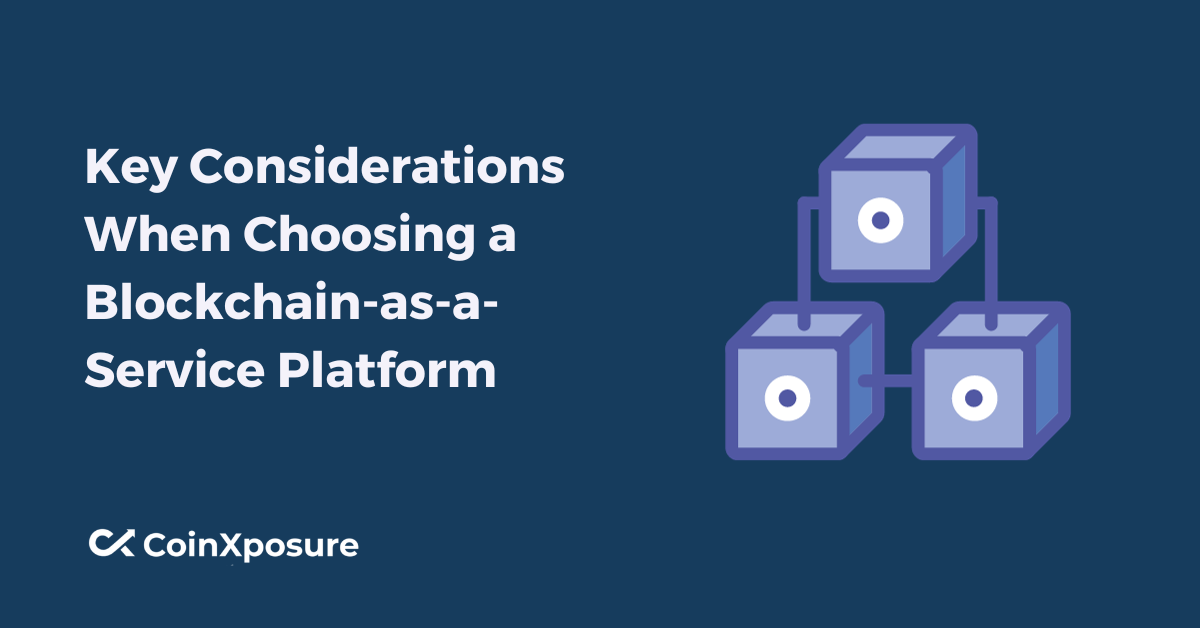
Key Considerations When Choosing a Blockchain-as-a-Service Platform
Choosing the right Blockchain-as-a-Service (BaaS) platform is critical for businesses aiming to leverage blockchain technology without the complexities of infrastructure management. Several key considerations come into play in this context, ranging from security and scalability to interoperability and compliance.
Navigating this landscape requires a nuanced understanding of the unique features offered by various BaaS providers.
This article explores the pivotal factors businesses should weigh when selecting a BaaS platform to ensure a seamless integration that aligns with their technical requirements and overarching business goals.
Definition of Blockchain-as-a-Service (BaaS)
Blockchain-as-a-Service (BaaS) is a cloud-based service model that allows businesses and individuals to utilize blockchain technology without creating and maintaining their own blockchain infrastructure.
Similar to other “as-a-Service” models, such as Software-as-a-Service (SaaS) or Platform-as-a-Service (PaaS), BaaS provides a simplified and accessible way to deploy, manage, and scale blockchain applications.
BaaS offerings typically include pre-configured blockchain networks, smart contract capabilities, and other essential tools, enabling users to focus on application development and deployment without the complexities of setting up and managing the underlying blockchain infrastructure.
Growing Importance of BaaS in Various Industries
The growing importance of Blockchain-as-a-Service (BaaS) is evident across various industries due to several key factors:
- Cost Efficiency
- Rapid Deployment
- Focus on Core Competencies
- Scalability
- Interoperability
Cost Efficiency
BaaS eliminates the need for organizations to invest heavily in building and maintaining their blockchain infrastructure. This cost-effective approach makes blockchain technology accessible to a broader range of businesses, including startups and smaller enterprises.
Rapid Deployment
BaaS providers offer pre-configured blockchain networks and development tools, streamlining the process of deploying blockchain applications. This accelerated development cycle enables businesses to prototype, test, and implement blockchain solutions quickly.
Focus on Core Competencies
BaaS allows organizations to concentrate on their core competencies without the burden of managing complex blockchain infrastructure. This is particularly valuable for companies lacking in-house blockchain technology expertise.
Scalability
BaaS platforms often provide scalable solutions, allowing businesses to seamlessly adapt to changing demands and scale their blockchain applications. This scalability is crucial for industries experiencing dynamic growth or fluctuating transaction volumes.
Interoperability
BaaS offerings often support interoperability with existing systems and technologies. This facilitates smoother integration of blockchain solutions into diverse business environments, promoting compatibility with legacy systems.
As industries continue to recognize the potential of blockchain technology, the adoption of Blockchain-as-a-Service is likely to increase, driving innovation, improving efficiency, and transforming traditional business processes.
Key Considerations in Blockchain-as-a-Service (BaaS) Platforms
When evaluating Blockchain-as-a-Service (BaaS) platforms, several key considerations should guide your decision-making:
- Security
- Scalability
- Interoperability
- Cost
- Development Tools and APIs
Security
- Evaluate the platform’s security features, including encryption methods and consensus mechanisms.
- Ensure compliance with industry standards to address data privacy and protection requirements.
- Assess the immutability of the ledger to guarantee the integrity of stored data.
Scalability
- Examine the platform’s ability to handle increasing transaction volumes and a growing user base.
- Verify the flexibility to scale resources based on evolving business needs.
- Consider the platform’s performance under varying workloads.
Interoperability
- Check compatibility with existing systems and protocols to facilitate smooth integration.
- Assess support for multiple blockchain networks, enabling interoperability across diverse ecosystems.
- Ensure seamless connectivity with third-party applications and services.
Cost
- Understand the platform’s pricing structure, including any transaction fees.
- Evaluate the scalability of pricing to accommodate changes in usage and business growth.
- Look for transparent cost models to avoid unexpected expenses.
Development Tools and APIs
- Assess the availability and user-friendliness of development tools provided by the platform.
- Ensure the presence of comprehensive APIs for customization and integration.
- Verify support for smart contract development and deployment.
These considerations collectively contribute to choosing a BaaS platform that aligns with your technical requirements and broader business objectives, fostering a successful integration of blockchain technology into your operations.
Conclusion
Selecting the right Blockchain-as-a-Service (BaaS) platform is a pivotal decision with profound implications for businesses aiming to harness the benefits of blockchain technology.
The considerations outlined—ranging from security and scalability to interoperability and vendor reputation—underscore the complexity of this decision-making process.
A judiciously chosen BaaS platform provides a secure and scalable foundation, aligns with compliance standards, fosters innovation, and supports seamless integration with existing systems. The cost-effectiveness and rapid deployment capabilities of BaaS further position it as a transformative force across various industries.
As industries continue to evolve in the digital era, the role of blockchain technology becomes increasingly prominent. The adoption of BaaS is a facilitator, democratizing access to blockchain capabilities and enabling organizations to focus on core competencies while navigating the intricacies of a decentralized future.
In navigating this landscape, businesses must remain vigilant in assessing their unique needs, understanding the specific features offered by BaaS providers, and staying attuned to the evolving regulatory landscape.
Ultimately, a well-informed decision in selecting a BaaS platform is not only a technical imperative but a strategic investment in the future resilience and innovation of the organization.
